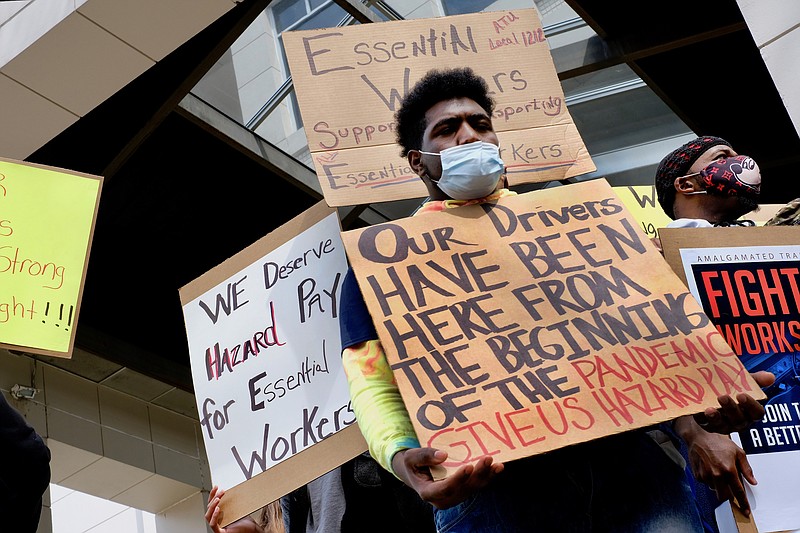Dozens of CARTA employees and supporters rallied along Market Street Sunday afternoon in a push for the transportation agency to restore hazard pay for its drivers and better recognize the struggle they faced in the past year of the pandemic.
Lakecha Strickland, president of Amalgamated Transit Union Local 1212, said the Chattanooga Area Regional Transportation Authority's decision to end hazard pay for its drivers in January was a "slap in the face" to those who have been on the front lines for 12 months. The union said about one in five local drivers has contracted COVID-19.
"Not only are we dealing with the pandemic, we are dealing with mental illness and simple assault along with the virus raging through our households," Strickland told the crowd. "Our lives and our family's lives have been put in jeopardy."
CARTA employees said the hazard pay has been critical to helping them buy extra, and necessary, protective gear and cleaning supplies they said the authority is failing to provide. The union accused CARTA leadership of giving hazard pay to its upper management, despite their not being on the front line, and providing raises and promotions to themselves around the time the extra pay was cut for drivers.
James Boles, a CARTA employee for 13 years, was hospitalized with COVID-19 in November and placed on a ventilator in the intensive care unit. The virus affected his heart, he said, resulting in his now having a pacemaker. CARTA is not listening to its drivers and taking the steps to keep them safe, he said.
"I would not want to see a coworker out here go through what I went through," Boles said.
CARTA received $11.9 million in April 2020 from the CARES Act and $3 million at the end of 2020 for COVID-19 relief, said Lisa Maragnano, executive director of the authority, in a statement. The CARES Act grant covered the organization through January 2021 and the additional grant funds will not be used until CARTA's 2022 fiscal year, which begins in July, Maragnano said.
The $1.9 trillion American Rescue Plan Act of 2021 passed this month may provide further funding for the local transit organization, but exact allocation has not been determined.
Maragnano, in her statement, said neither of the federal grants for pandemic relief required CARTA provide hazard pay for its employees.
"The funding from the new American Rescue Plan has not yet been allocated; when it is, CARTA has discussed with the union representatives whether there is sufficient funding to consider a lump sum payment for employees which could possibly replace the discontinued hazard pay, but we cannot yet make that determination," she said. "CARTA is also considering providing broader services to our customers, such as increased frequencies of bus service on some of our main routes, which would cost additional money."
CARTA's 857-word statement to the Times Free Press did not address the accusation of promotions and raises for leadership.
ATU Local 1212 is also asking for a seat on CARTA's board to be filled by a driver, someone they said who would have direct knowledge of the challenges facing workers.
The authority's board members are appointed by the Chattanooga and Hamilton County mayors. Maragnano said putting a CARTA employee on the board would create a conflict of interest, since the board votes on labor contracts. People in the union or in the community can speak at the monthly board meetings, she said.
Jenny Stolz, a 16-year CARTA employee, said the decisions around cutting hazard pay, threats of layoffs and management promotions shows a lack of empathy and understanding from the organization's leaders toward its most essential employees.
"I felt violated," Stolz said. "That's like stabbing me in the back. When I go out and drive every day, it's to keep them going."
Contact Wyatt Massey at wmassey@timesfreepress.com or 423-757-6249. Follow him on Twitter @news4mass.

